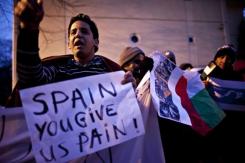Do you know who I am?
I am a Sahrawi. The land to which I refer is what is known today as the non-self-governing territory ofWestern Sahara. My country was colonized by the Spanish and the French between 1884 and 1975, divided in two and occupied by Moroccan and Mauritanian forces thereafter, and has been ruled exclusively by the Kingdom of Morocco from 1979 until the present.
this is one part of the Arab Spring that western governments don't want to talk about. And their silence, and the UN's complicity in it, is why that repression continues, and a terrible injustice is perpetuated.
Respect the right of individuals to peacefully express their opinions regarding the status and future of the Western Sahara and to document violations of human rights
it has emerged that the single biggest beneficiary of the deal will be the King of Morocco, who is head of one of the three largest agricultural producers in the north African country and lays claim to 12,000 hectares of the nation's most fertile farmland.
Oblivion it seems is the current reality for the arid North African territory of Western Sahara; often referred to as Africa’s ‘Last Colony’. In my opinion, it would be more accurate to describe it as ‘Africa’s Forgotten Colony’.







 Spain has been advocating a new protocol with Morocco relentlessly. Under the previous protocol, the country received no less than 100 of 119 available fishing licenses. The Parliament’s veto in December resulted in 64 Spanish ships, mainly from Andalusia and Canary Islands, having to leave Saharan and Moroccan waters.
Spain has been advocating a new protocol with Morocco relentlessly. Under the previous protocol, the country received no less than 100 of 119 available fishing licenses. The Parliament’s veto in December resulted in 64 Spanish ships, mainly from Andalusia and Canary Islands, having to leave Saharan and Moroccan waters.
0 comments:
Post a Comment